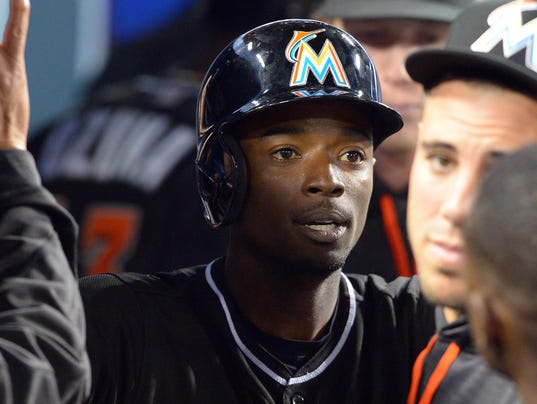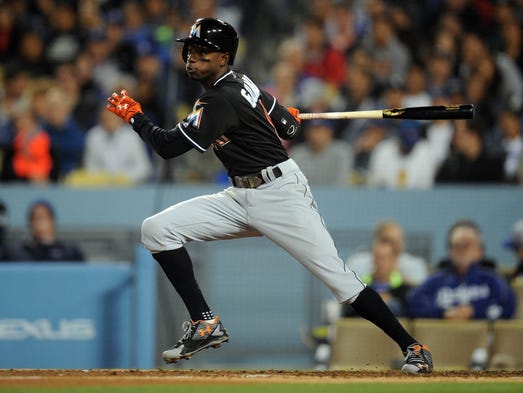DJ COMMUNITY
Why did Dee Gordon take steroids? Better question: Why wouldn't he?
Dee Gordon’s friend woke up to the stunning news Friday morning in Miami, took time to grasp what happened, and had the sudden urge to call.
Gordon, his good friend, was suspended by Major League Baseball player, the latest player whose feel-good story was smashed into smithereens after being popped for performance-enhancing drugs.
Yet, after listening and reading the ridicule, Gordon’s confidant made the call to USA TODAY Sports.
“Why wouldn’t he do it?’’ said the friend, who requested anonymity due to the sensitive nature of the topic. “Think about it, why wouldn’t Dee take that chance? Why wouldn’t anyone?
“So he got caught. So what? It was better than spending his career in the minors. His image may be shot, but he’s still has got his $50 million in the bank and can take care of his family for the rest of his life.
“So really, when you think about it, it’s worth it.’’
Silence.
He’s right.
The risk, and 80-game suspension, still is worth it to Gordon.
Gordon, 28, one of the finest young men you’ll ever want to meet, had an impeccable image. He overcame a childhood in which his mom was murdered by her boyfriend when he was 6, and was raised by his dad’s grandmother. His dad was former major leaguer Tom Gordon, but Gordon was off playing baseball for 20 years, and had other children to take care of during the winter.
Still, Gordon made the big leagues at the age of 23 with the Los Angeles Dodgers, bounced back and forth from the big leagues to the minors, and was given up by the Dodgers after the 2014 season when they considered him no more than a part-time player.
They traded him to the Marlins, even paying his salary as part of the trade, and watched him become the 2015 batting champion and stolen-base king last season for the Miami Marlins. He became the first National League player to win a batting title (.333) and lead the league in stolen bases (58) since Jackie Robinson in 1949.
The Marlins, so impressed and dazzled by Gordon’s play and personality, rewarded Gordon with a five-year, $50 million contract extension. He cried at the news conference. Nearly cried again last week when owner Jeffrey Loria presented him with a diamond-studded medallion that featured the Marlins’ logo and “333’’ on the front; and his name, number and message from Loria on the back.
And, yes, was in tears again Thursday night when he told his teammates that he tested positive in spring training for PEDs, synthetic testosterone and clostebol, to be exact, and had decided to drop his appeal.
Sorry, guys - see you again on July 29.
Gordon did not speak to reporters afterward, but issued a statement through theMajor League Baseball Players Association:
“Though I did not do so knowingly, I have been informed that test results showed I ingested something that contained prohibited substances. The hardest part about this is feeling that I have let down my teammates, the organization and the fans. I have been careful to avoid products that could contain something banned by MLB and the 20+ tests that I have taken and passed throughout my career prove this. I made a mistake and I accept the consequences.’’
It was a horribly weak excuse. So he’s saying he has no idea how it got into his system, but then says he made a mistake? And what difference does it make whether he passed drug tests earlier in his career? Is he trying to suggest this proves he didn’t take PEDs his entire career?
Please.
Gordon cheated. He’ll be docked $1.65 million in salary. And yes, he’ll still be guaranteed the remaining $48.35 million.
If he never cheated, perhaps he would be in the minors the rest of his career, never making $1.65 million in his entire life.
It was his own manager, Don Mattingly, who was with him throughout his Dodgers’ stint, who raved this week about Gordon’s transformation.
“What I liked about Dee was his swing,’’ Mattingly said before the teams' four-game series at Dodger Stadium. “You have to remember, he was 140-something pounds when he came up. Now, he’s slowly over a few years built up, I think, he’s 170 pounds. This is a kid who has put on mature strength, along with a pretty good swing, and obviously the speed tool isn’t going away.’’
So, if banned substances aided his rise and will gross him $48.35 million, was it worth it? Even if it means destroying your image in baseball?
You make the call.
Gordon, if nothing else, ruins every stereotype you may have had about a steroid user. You don’t have to be big and strong and hitting home runs. Gordon is 5-foot-11, weighs 172 pounds, and has eight career homers.
Oh, and only the bad guys take steroids?
This is one of the nicest men you’ll ever meet, actually calling not only Marlins’ executives, “sir,’’ but even coaches, older players, and even reporters and older players.
Gordon’s positive test means only that there can be no stereotype for the steroid user. Young, old, big, skinny, nice, crotchety? There is no dress code for PED users.
They are littered throughout Major League Baseball, and perhaps there’s more out there than we ever want to believe.
“If you’re smart, you’ll never get caught,’’ Victor Conte, founder of BALCO and mastermind of this century's biggest doping scandal, told USA TODAY Sports this week. “The research shows that if you go home from the ballpark, and take a fast-acting testosterone, it will peak at 1 in the morning, get down before the 4-to-1 TE ratio by 4 in the morning, and by the time you get to the ballpark, you can’t test positive. That’s what A-Rod (Alex Rodriguez) and all of those guys in Biogenesis were doing.
“So to get caught now, you’ve got to be pretty dumb.’’
Then again, if PEDs set up generations of your family for life, maybe you’re actually pretty smart.
Gordon isn’t offering to give back a penny of the money he’s owed. He still gets his $1.5 million signing bonus. He’s owed $7.5 million in 2017. Then, $10.5 million in 2018. And $13 million in 2019. And $13.5 million in 2020. And $14 million in 2021.
And even if Gordon stinks the rest of his career, or reverts back to being a minor-league player, every single dollar is guaranteed.
So was it worth it?
This is why Major League Baseball and the players union has no choice to adopt stricter penalties in their next collective bargaining agreement, which expires on Dec. 1. Too many star players, such as Detroit Tigers Cy Young winner and MVP Justin Verlander, are railing against the system. It no longer can be 80 games for the first penalty, two years for the next, and then a lifetime ban.
A full-season ban for a first offense might help. Perhaps it's two strikes and a lifetime ban, instead of three. Or, if you really want to penalize the cheater, put in a provision in every contract that allows the clubs to decide whether to void the contract of any player who tests positive for PEDs.
After all, it’s a good chance that contract was signed under false pretenses.
If it was up to Chicago Cubs Cy Young winner Jake Arrieta, he says, it would be one-and-done.
You cheat, you’re out.
“If it’s a blatant attempt to cheat the system with a steroid,’’ Arrieta said, “maybe so. It’s apparent that guys are still trying to take things. And I think it’s unfortunate. I think guys will continue to do so unless the penalties are stiffer. I personally don’t think that guys should get multiple chances when they fail a steroid test. …
“But what’s at stake, some people are willing to take the risk. That’s why the drug problem is what it is. Guys will still attempt to beat the system. Shortcuts have always been around in all sports, but as a union, we’re trying to do everything we can to weed those guys out of the games.’’
Perhaps it’s also time to modify the appeal system. Gordon, just like Toronto Blue Jays first baseman Chris Colabello, tested positive during spring training. It wasn’t until now that their appeals were heard. Colabello lost his appeal, and Gordon, knowing he was going to also lose his, dropped it just before it was going to be official, anyways.
During this process, Gordon played the first three weeks of the season. He played a vital role in the Marlins’ 4-2 victory Thursday night over the Dodgers at Dodger Stadium, scoring a run on a balk, driving in the game-tying run, completing the Marlins’ first four-game sweep at Dodger Stadium.
He's out until after the All-Star break, but left the Marlins a nice parting gift, to the consternation of many.
“This PED (expletive) is killing me,’’ Verlander sent out in a tweet. “If you test positive, u need not top play. You shouldn’t be allowed to affect games.’’
Point well-taken.
Yet, this still is America, where due process rightfully reigns.
What if there’s a false positive? What if it wasn’t the fault of the player taking a banned substance and it instead was accidentally administered by a team doctor or trainer?
Perhaps there’s a compromise here. Perhaps the player isn’t permitted to play in games during the appeal process, but yet, still is paid and can work out with the team and play in minor-league games.
Major League Baseball and the union need to figure it out.
Until they do, players will still cheat, the public will still suspect, and the drug epidemic will never fade away.
And soon enough, Dee Gordon will get paid again, and it will be even easier to comprehend why he did it.
Follow Nightengale on Twitter: @Bnightengale
Views: 19
Comment
© 2025 Created by Janelle.
Powered by
![]()


You need to be a member of NASTYMIXX to add comments!
Join NASTYMIXX